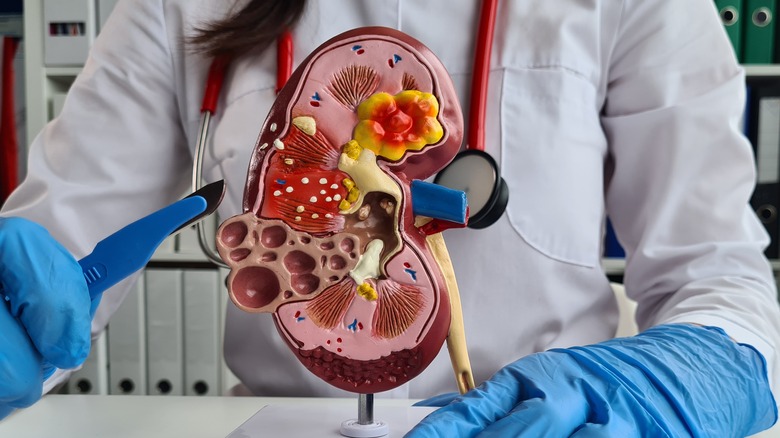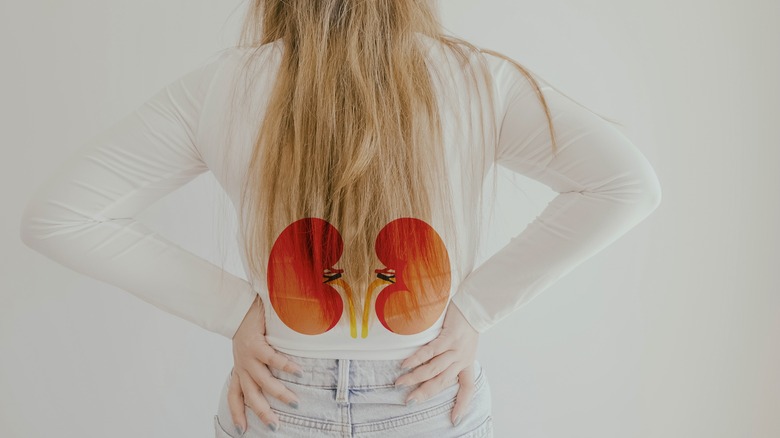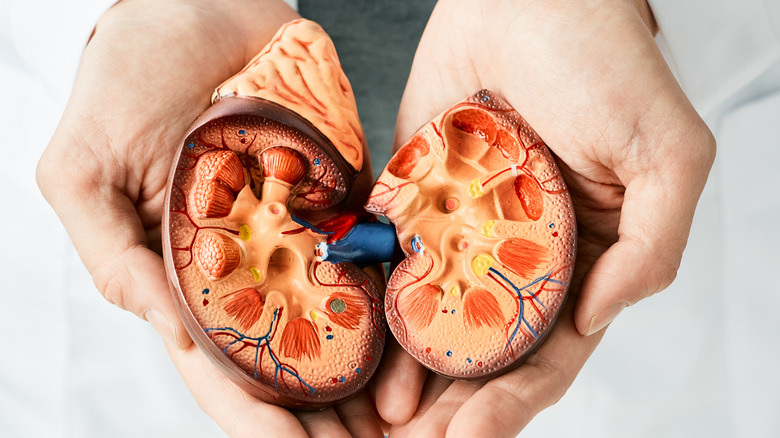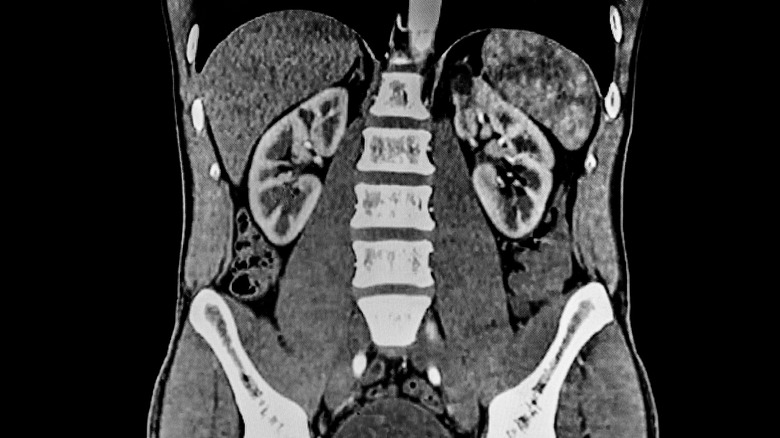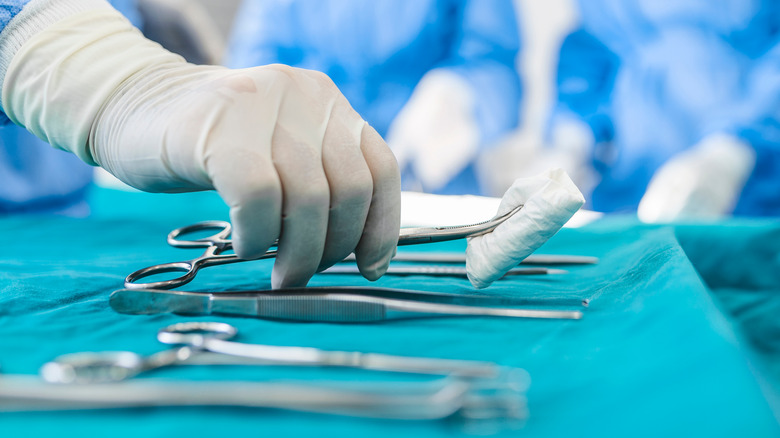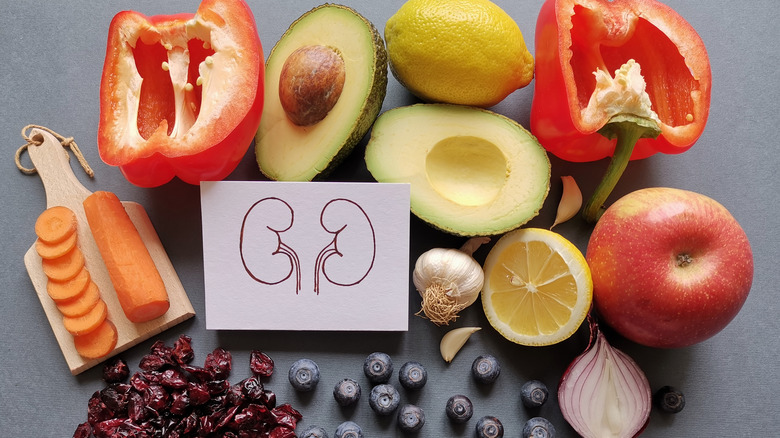Everything You Need To Know About Kidney Cysts
The kidneys are part of the body's waste elimination process, according to the National Kidney Foundation. The kidneys' essential function is to filter blood and aid in the elimination of waste through the production of urine. The kidneys are also involved in the regulation and balance of blood pressure, red blood cell count, and minerals like potassium.
The kidneys are fairly sturdy organs, however, there are a few things that you should know about kidney health. As part of the urinary system, the kidneys can be subject to infection, explain Mayo Clinic. Most commonly, kidney infections are urinary tract infections that begin in the urethra or the bladder and travel up to the kidneys.
Another common kidney health concern is kidney cysts. A cyst is a sac of fluid, membraneous tissues, air, and other substances. Cysts can form virtually anywhere on the body, including the kidneys. There are two types of cysts: simple cysts and cysts which are caused by polycystic kidney disease.
Simple kidney cysts
Simple cysts are fluid-filled sacs that have thin walls. They are fairly common and rarely pose a major health risk, according to Healthline. In most cases, they do not produce any symptoms in the individual. However, if a cyst becomes too large or otherwise inflamed, symptoms such as pain, fever, dark, and/or increased urination may develop.
They can range in size, with some cysts so small they require microscopes to be seen and others being large enough to be visible on a kidney scan.
In some cases, the walls of the cyst are thin enough that with pressure from external or internal forces, the cyst ruptures, and the fluid inside is eliminated by the body (via National Kidney Foundation). Ruptured kidney cysts may also cause pain in the lower abdomen, fever, and blood in the urine.
Without the presentation of symptoms, simply kidney cysts are typically discovered while receiving a scan for another reason. Additionally, simple cysts do not typically cause damage to the kidney tissue or function.
Cysts caused by polycystic kidney disease
Polycystic kidney disease (PKD) is a genetic condition that causes a large number of cysts to form on the kidneys. The number and growth of the cysts cause the kidneys to become enlarged and function is reduced.
In many cases, individuals with PKD are required to undergo kidney dialysis and/or a kidney transplant. While doctors aren't quite sure of the reason that simple cysts form, PKD is a genetic disorder passed down from at least one parent who presents with the disease. Additionally, PKD is unique in that the cysts are not restricted to only the kidneys, but can and often do appear in other areas, such as the liver, ovaries, or skin (via Mayo Clinic).
There are two types of PKD: autosomal dominant PKD and autosomal recessive PKD. Autosomal dominant PKD symptoms typically do not appear until an individual is in their 30s while autosomal recessive PKD symptoms are present at birth. Autosomal dominant PKD accounts for the majority of polycystic kidney disease patients (per National Kidney Foundation.)
Diagnosis of kidney cysts
For individuals with simple cysts, diagnosis and identification may never occur unless the cyst becomes inflamed, infected, or ruptured causing the individual to recognize an issue, notes Healthline. For individuals with PKD, most often, there is a family history of the disease. The diagnosis process for identifying cysts can be done by your physician, though sometimes a specialist, such as a nephrologist or a urologist, is needed.
Imaging tests like MRIs, CT scans, and sonograms are used to determine if the kidneys have masses and if they are cystic or tumors (via Mayo Clinic). These imaging tests can also indicate if there are multiple cysts and their relative size. Another measure for identifying cysts in patients with PKD can include blood tests. These blood tests can provide information regarding renal function or any decline, which is most often a side effect of kidney cysts. Other tests can include urinalysis and palpation of the area.
Treatment of kidney cysts
Treatment options for kidney cysts can vary, depending primarily on the type of cysts presented. For simple cysts, treatment is often not needed unless the cyst becomes problematic or painful for the individual. According to Healthline, routine monitoring of the cyst or cysts may be recommended to determine if treatment is needed. For simple cysts, treatment can include sclerotherapy or surgery. In sclerotherapy, a needle is injected through the skin, into the cyst to drain the fluid. In some cases, a solution is injected to prevent the cyst from refilling. For larger cysts, surgery may be needed to remove the mass.
Patients with PKD, however, face challenges with proper treatment. PKD is not a curable disease and does not offer many options for treatment before kidney function has declined severely enough to need dialysis or transplant (via National Kidney Foundation). While there is not a prevention routine to reduce PKD, diet and lifestyle may provide some aid in maintaining kidney health.
Keeping your kidneys healthy
Maintaining a healthy lifestyle provides a smoother functioning process for your kidneys. As kidneys are the filter system for the blood, opting to eat a healthy diet with balanced protein, fats, carbohydrates, and fiber can help to reduce the impact the kidneys experience (per Healthline). Other options for improving your kidney health include having an active and fit lifestyle. Sedentary activities can cause an increased risk of developing kidney disease.
Another factor that plays a role in kidney health is blood pressure. High blood pressure increases the stress on the kidneys and can cause damage. By monitoring and maintaining healthy blood pressure, the risk of kidney damage is reduced.
Another important factor for kidney health comes from blood sugar. When blood sugar is too high, the kidneys must work harder to eliminate the excess in urination, which can lead to kidney damage. If you have a history or family history of kidney disease, cysts, urinary tract infections, or PKD, it's important to follow up with your doctor and maintain routine screening.

